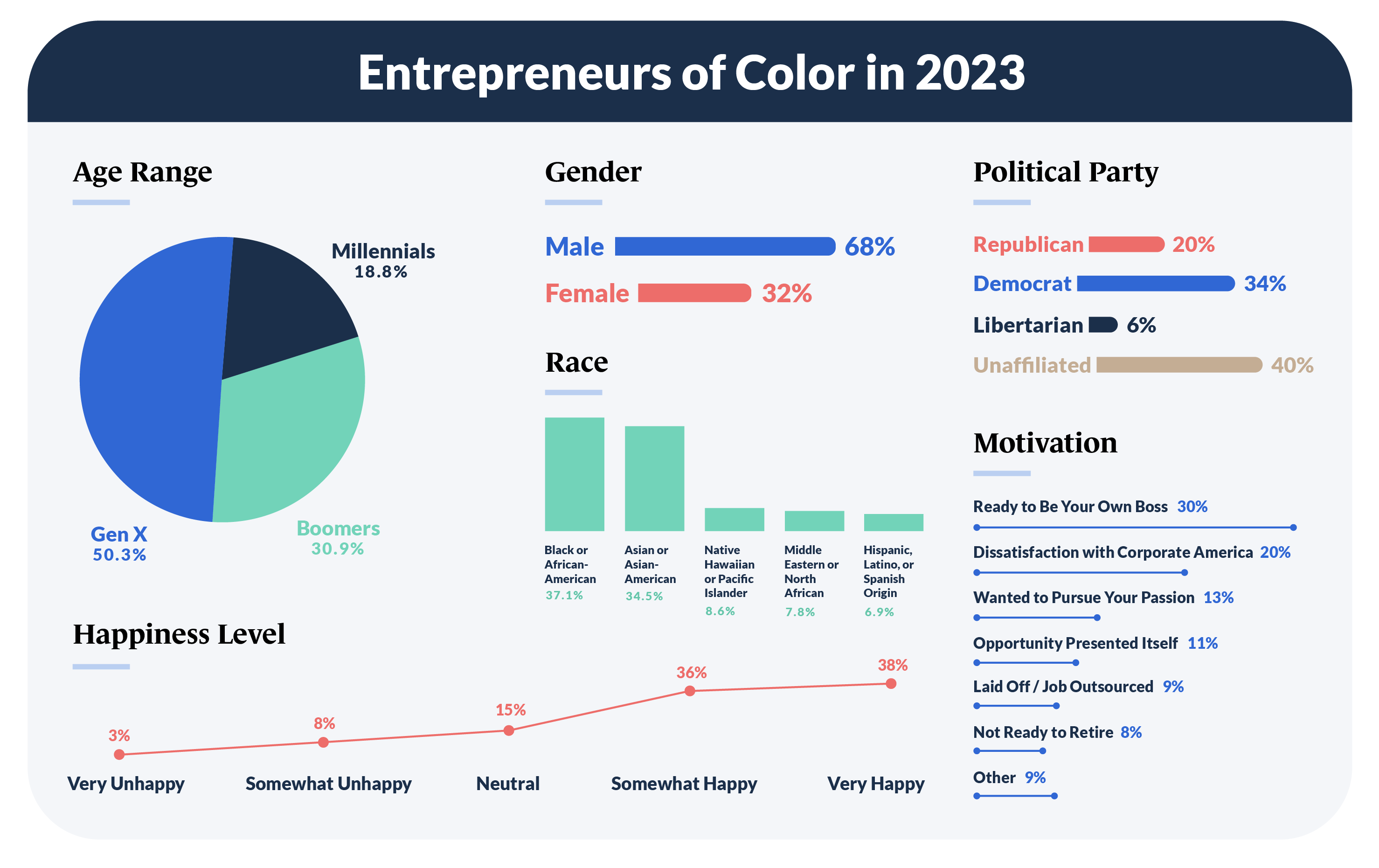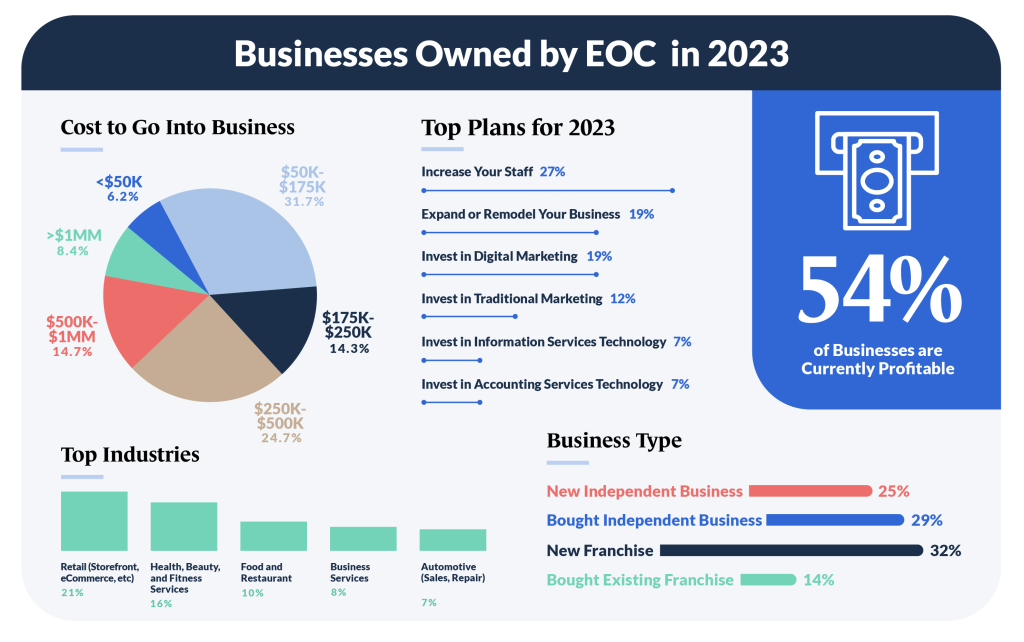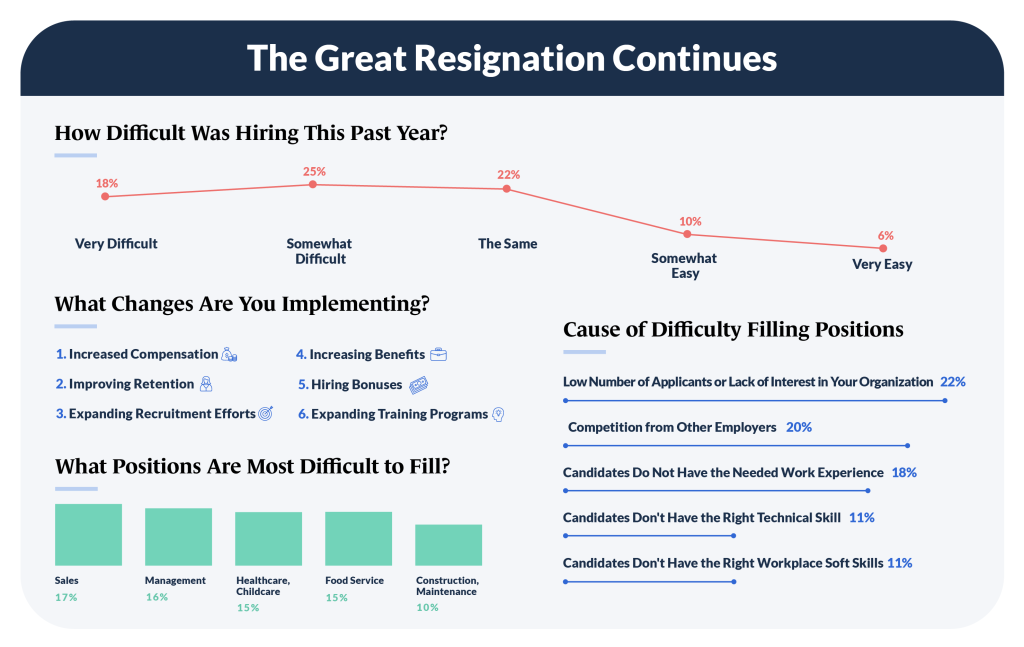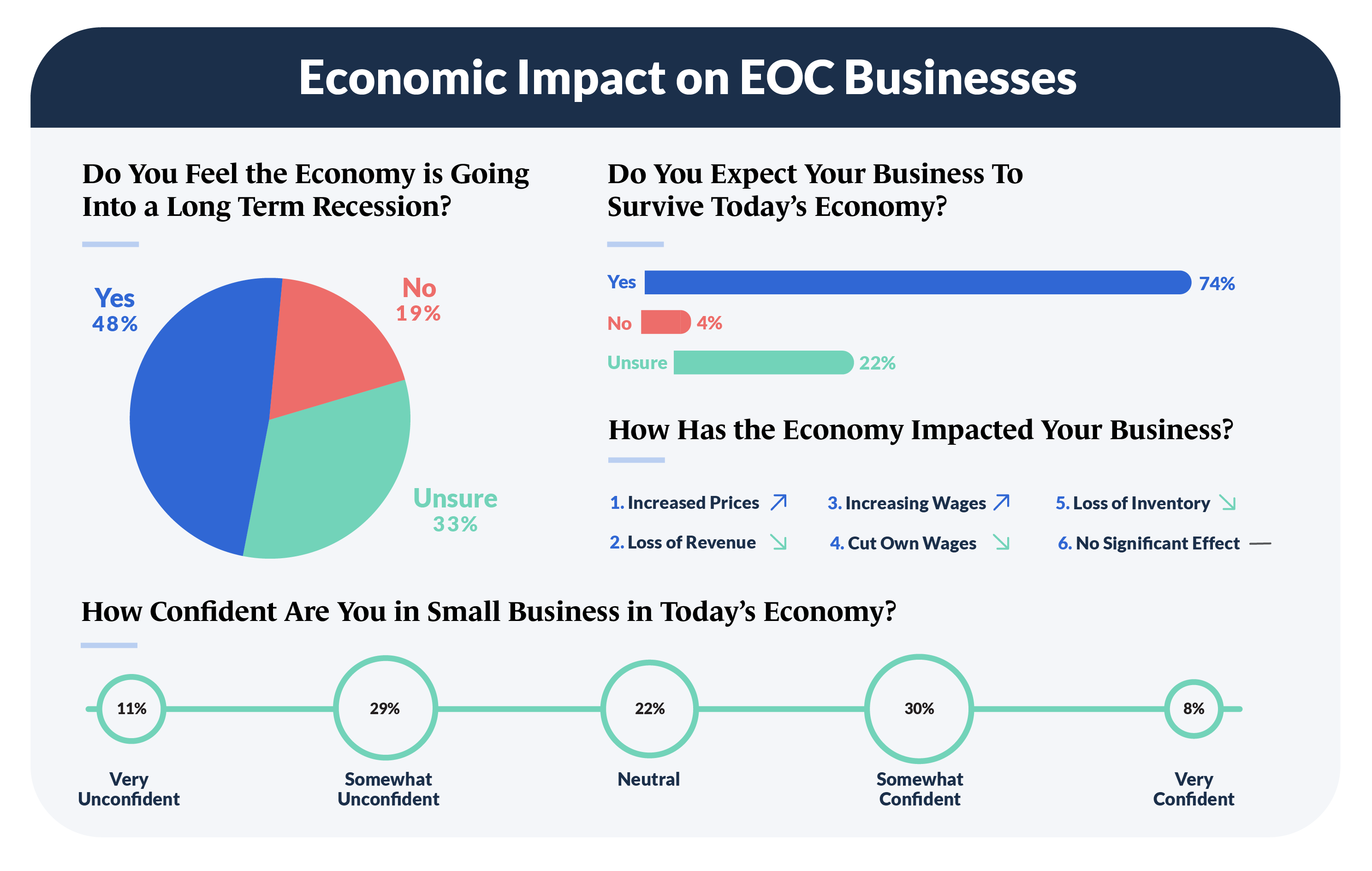2023 Small Business Entrepreneurs of Color
A Look at the State of Entrepreneurs of Color in 2023
Each year, Guidant reaches out to the hardworking small business owners across the country to gain insights into their experiences, challenges, and future plans. We also acknowledge the critical role businesses owned by women and entrepreneurs of color play in the economy. In this segment of our Small Business Trends report, we’ll provide trends, insights, and experiences reported by entrepreneurs of color this year.
Supporting the growth and success of underserved communities is a priority for Guidant, including businesses owned by women and entrepreneurs of color. We’re excited to share these trends and stories from entrepreneurs of color. By showcasing the great economic contributions of entrepreneurs of color, we aim to highlight the value of diversity in the world of small business.
Index
Who are Entrepreneurs of Color in 2023?
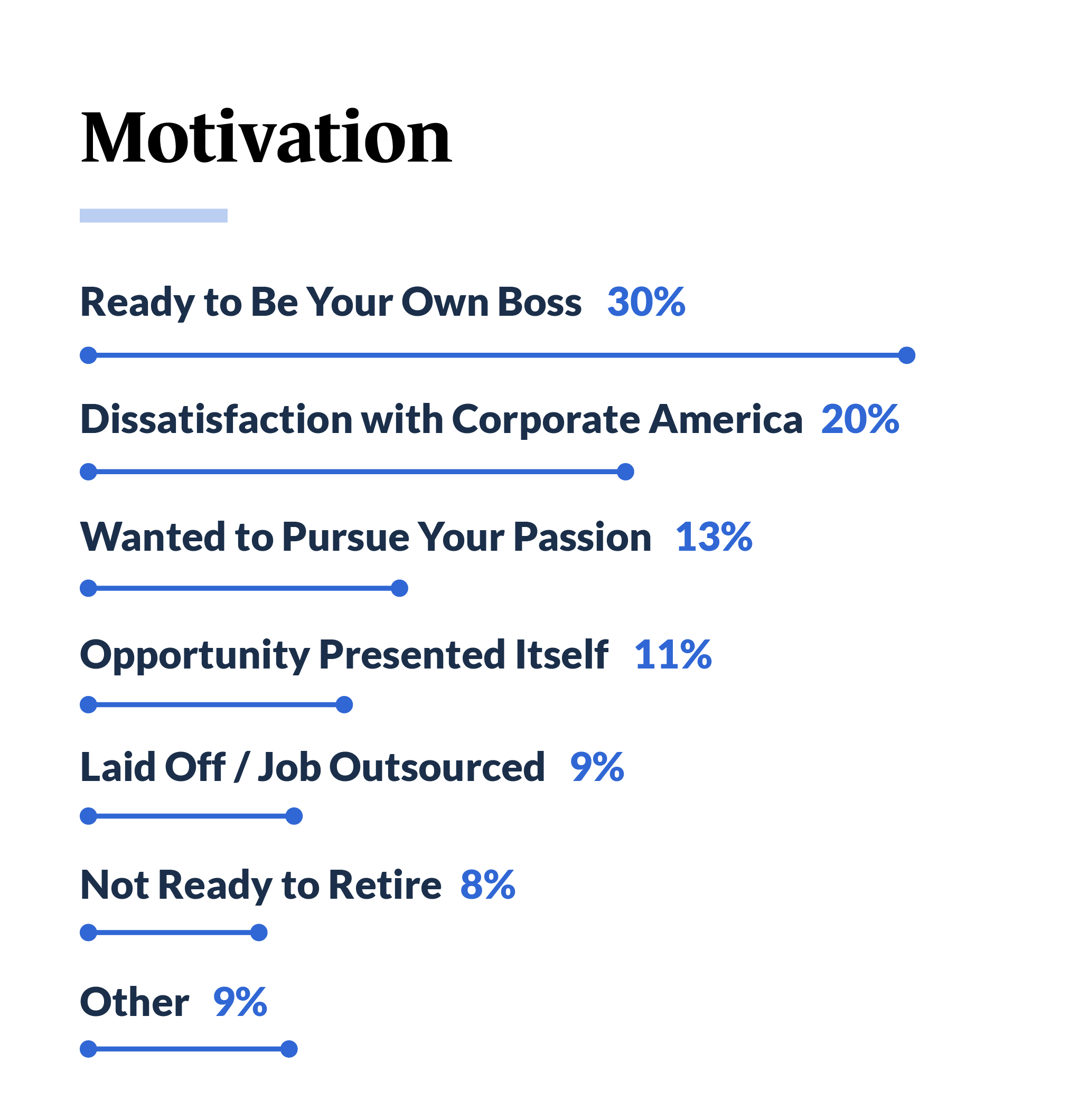
When it came to starting their businesses, a similar percentage of respondents cited job loss (9%) or a presented opportunity (11%), such as purchasing an existing business. Slightly fewer respondents considered delaying retirement a factor — with only eight percent of respondents saying they weren’t ready to retire.
The COVID-19 pandemic had a disproportionate impact on communities of color, according to multiple research studies. Black, Native American, and Hispanic communities experienced significantly higher rates of infection, hospitalization, and death due to COVID-19. People of color were generally disproportionately affected economically by the pandemic. While the economic impact of COVID-19 is lessening, it’s likely that minority-owned small businesses are still feeling the significant impact of the pandemic.
Despite these challenges small businesses have faced over the past few years, our survey shows that entrepreneurs of color are feeling happier and more confident this year.

Compared to last year’s study, we see a 33 percent in very happy business owners of color. That means more and more business owners are shifting toward happiness this year — not only for entrepreneurs of color, but for all small business owners.
While business owners of color were slightly more likely to be happy compared to other respondents, small business owners surveyed were generally content this year. In our main study, over 70 percent of small business owners feel satisfied as business owners.
Overall, the majority of entrepreneurs of color are satisfied as business owners. In fact, compared to the main study, minority business owners were slightly more likely to be “somewhat happy” to “very happy” (two percentage points higher).
Compared to pre-pandemic levels, Black business ownership rose by 38 percent this year with a reported 23 percent uptick in annual revenue growth, which is twice as fast for the average American business. Black-owned small businesses also recruited employees at double the rate of all businesses across the US — showing promising growth and confidence in the future of small businesses owned by people of color.
The Age Divide
The generational gap between small business owners is a significant factor, including for entrepreneurs of color. Our study revealed that more than half of small business owners of color were from the Gen X generation (50.34%), with over 30 percent from the Boomer generation (30.97%). In contrast, less than 19 percent of entrepreneurs of color surveyed were Millennials (18.79%).
With each passing year, the face of small business ownership is changing — and we’re seeing more and more younger generations beginning to make their marks in the business landscape. More millennial business owners of color have jumped by 32 percent compared to last year’s study, while we’ve seen a 15 percent decrease in business owners from the Boomer generation.
This trend is likely to continue among all business owners within the next several years as more Millennials reach the average age of business ownership, which is roughly 35-years-old according to Bloomberg.
While the age divide in small business ownership is still steep, it’s evident the gap is narrowing and will continue to close in the future.
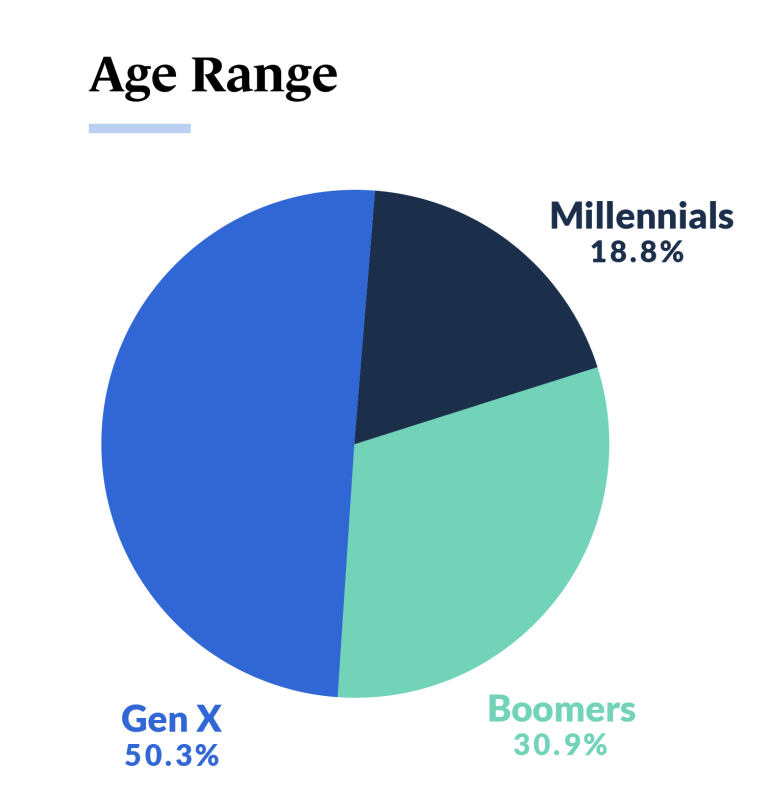
Diversity in Business
Among small business owners of color, men continue to be more likely to own and operate their own businesses than women compared to the main study. Of the respondents of color surveyed, 68 percent identified as male while 32 percent identified as female.
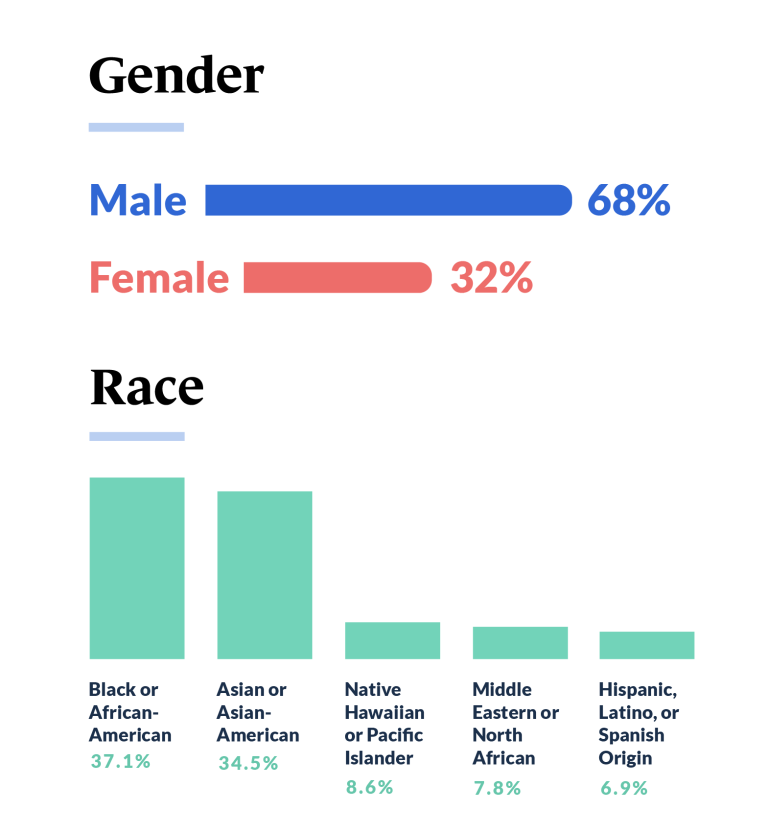
However, it’s worth noting that women of color are starting and growing businesses at a faster rate compared to any other demographic in the US. In fact, majority Black women-owned firms grew by 67 percent from 2007 to 2012, compared to 27 percent for all women — and 50 percent from 2014 to 2019, representing the highest growth rate of any female demographic during that time frame.
Our study also reflects a trend in women of color business owners. Women-owned businesses are 28 percent higher among entrepreneurs of color among respondents surveyed this year.
Entrepreneurs of color made up roughly 19 percent of our total respondents this year, a nearly five percent increase from 2022.
Of those surveyed, our study found that the majority of business owners of color were “Black or African-American” (37%) and “Asian or Asian-American” (34%).
The third largest group of business owners surveyed were “Native Hawaiian or Pacific Islander” (8.62%). About seven percent of respondents identified as “Hispanic, Latino, or Spanish-Origin” (6.90%) and “Middle Eastern or North African” (7.76%).
Political Affiliation
As for political affiliation, a majority of entrepreneurs of color surveyed didn’t feel represented by any political party (40%).
The second largest number of respondents affiliated as Democratic (34%), and the third largest group affiliated as Republican (20%). Meanwhile, only six percent of business owners of color reported being Libertarian, showing a slight increase from last year. These results are very similar to last year’s, showing no significant change among political party affiliations for entrepreneurs of color.
However, compared to the main study, entrepreneurs of color were 26 percent more likely to feel unrepresented by any political party and 75 percent more likely to affiliate as Democratic.
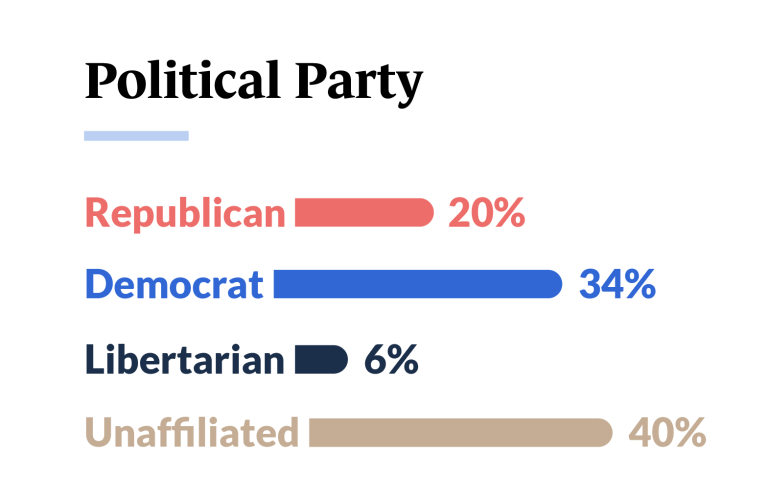
While most small business owners affiliate as Republican in the main study, most minority small business owners either don’t feel represented by any political party or affiliate as Democratic. In fact, our data shows that entrepreneurs of color were 52 percent less likely to associate with the Republican party.
Education Levels
According to our Small Business Trends study, there is a strong correlation between education levels and business ownership. This holds especially true for entrepreneurs of color. Among the respondents surveyed, 82 percent held a master’s degree (38%), bachelor’s degree (34%), and an associate degree (10%). A smaller percentage of respondents held a doctorate degree (9%).
Only nine percent of surveyed business owners had only a high school diploma. Like the main study, this data shows that business owners of color also value higher education and investing in knowledge. In fact, entrepreneurs of color were two percent more likely to hold a degree.
What are Small Businesses Like in 2023?
Business Types
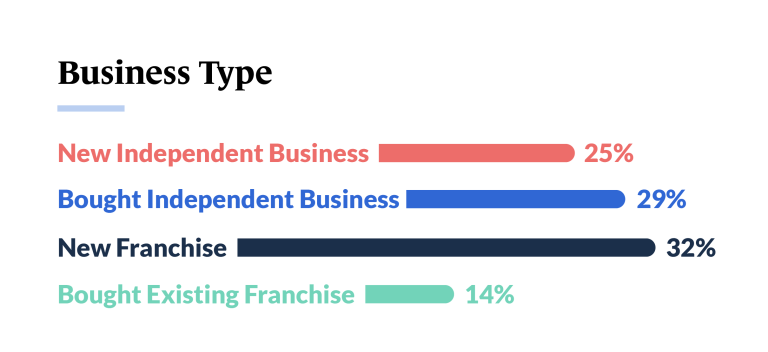
In addition, 29 percent of respondents reported purchasing an existing independent business. Compared to the main study — where 33 percent bought an independent business — minority business owners had a slightly lower tendency to acquire an existing independent business.
Interestingly, business owners of color were slightly more likely to start a new independent business from scratch compared to the main study. A quarter of surveyed respondents (25%) reported that they started a new independent business.
The smallest number of respondents reported purchasing an existing franchise location (14%).
Top Industries
The retail industry remains the most popular industry for small businesses. Entrepreneurs of color comprised of 21 percent of retail businesses among respondents surveyed this year. Retail has long been popular in the small business landscape, coming in as a top industry for in our Small Business Trends study for the past three years. Compared to our main study, entrepreneurs of color were about 17 percent more likely to own a retail business.
The Health, Beauty, and Fitness services industry came in as a second industry for business owners of color this year, accounting for 16 percent of businesses reported. This area has seen significant growth in recent years, coming in as the top third industry in our main study. Additionally, the Food and Restaurant industry remains popular, with 10 percent of respondents holding businesses in this sector.
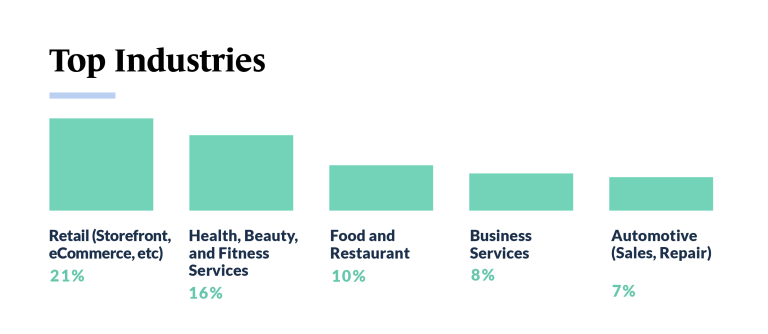
Business services (8%), automotive services (7%), and education (7%) tied roughly for fourth place among top industries for business owners of color. Childcare services and residential services each accounted for six percent of small businesses owned.
While construction and contracting rose in demand as industry this year — coming in as the fourth top industry for small businesses this year — this sector doesn’t seem as prevalent among entrepreneurs of color. In fact, construction and contracting made up only five percent of businesses owned by minorities.
Top Plans for 2023
A significant number of business owners of color are planning on making strategic investments in their businesses this year — with an emphasis on addressing recruiting difficulties. According to respondents surveyed, the majority of business owners (27%) plan on increasing their staff.
In second place, both investing in business expansion and remodeling and digital marketing were popular plans, each coming in at 19 percent. This highlights the importance many entrepreneurs place on having a strong online presence in today’s digital age, as well as the value of improving the physical space of a business to attract more customers.
In terms of marketing, the study found that entrepreneurs of color were almost equally split between investing in traditional marketing (12%) and digital marketing (19%). While digital marketing is becoming increasingly more relevant, this data shows that many still value traditional marketing methods when it comes to small business.
Accounting and tax services and information technology services were of equal importance to entrepreneurs of color, with both coming in at seven percent in terms of investment plans for 2023.

Overall, these results follow the main study, where a majority of small business owners are focusing on recruitment and retention efforts this year. Increasing staff remained the top business plan among small businesses for the past two years now, while business expansion and marketing followed closely.

The Great Resignation Continues
Recruitment proved to be a significant challenge for business owners of color this year — with over 40 percent of surveyed respondents describing the hiring process as either somewhat or very difficult. In fact, 25 percent reported recruitment as “somewhat difficult compared to other years” and 18 percent as “very difficult compared to other years.”
Only 15 percent of business owners felt recruitment was somewhat (10%) or very easy (6%) this year. In some cases, business owners didn’t hire anyone at all (20%).
Small businesses across America are struggling with recruitment challenges, especially in the past few years. In our main study, over half of respondents described the recruiting process as difficult — which was a 16 percent improvement from 2022.
While small business owners are facing their share of recruitment difficulties, our study shows that over 40 percent of business owners of color found the hiring process easier this year.
Black-owned businesses have generally seen the most significant improvement in recruitment. According to a recent SCORE data report, Black-owned businesses added employees at double the rate of all American small businesses.
Overcoming Hiring Difficulties
In today’s increasingly competitive job market, small businesses are taking proactive steps to recruit and retain valuable employees in 2023. Small businesses are committed to making their employees happy — seeking to remain competitive in an increasingly demanding job market. What’s the best way to make an employee happy? For one, providing a comfortable and livable wage helps.
A majority of surveyed small business owners of color reported increasing compensation as a way to ease hiring difficulties this year (27%). In fact, the same percentage of respondents in our main study also reported increasing compensation to address recruitment challenges.
The second most popular measure taken among business owners of color was improving retention efforts for current employees (21%). Offering career growth opportunities, recognizing achievements, and providing flexible work hours are all great examples of retention efforts.
Many businesses have also taken steps to expand recruitment advertising efforts (10%), increase benefits (9%), and expand training programs (8%) to ensure they hire the best candidates for their open positions. Offering benefits like health insurance or flexible scheduling allows them to stay ahead of the competition when it comes to recruiting top talent in today’s market. Some business owners have added hiring bonuses this year (7%) as an added incentive for prospective employees.
Overall, business owners of color are working hard to adapt to the changing labor market — and develop creative strategies for recruiting and retaining employees in 2023.
The Talent Struggle
Hiring employees remains a significant challenge for small business owners in 2023 — especially for certain positions. While it’s difficult to find qualified candidates across the board, the most difficult role to fill this year were sales and related positions (17%), management positions (16%), healthcare positions (15%) and food service positions (15%) among business owners of color.
Construction, maintenance, and transportation roles were also somewhat challenging to hire this year, with 10 percent of respondents surveyed reporting difficulty hiring for these positions each. Only nine percent of business owners of color struggled to hire administrative or business support roles.
But why have these positions been so difficult to fill? Our study suggests that a shortage of skilled candidates and high competition are the leading factors contributing to recruitment challenges among small business owners of color.
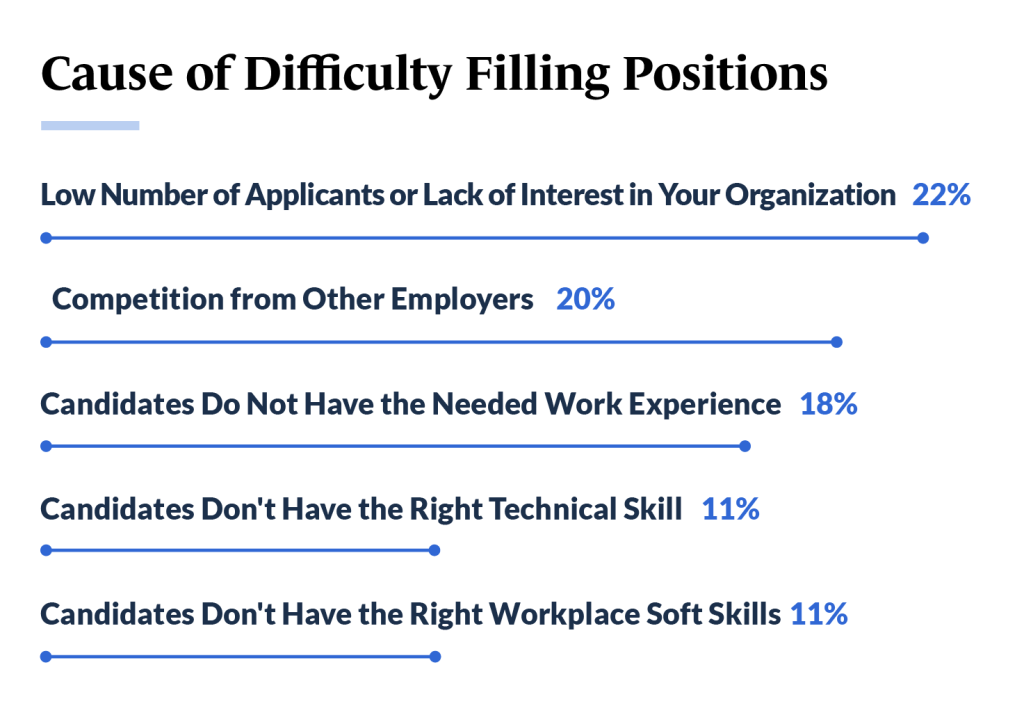
A majority of respondents reported a low number of applicants or lack of interest as a significant recruitment barrier (22%). Coming in at a close second, 20 percent of business owners reported competition from other employers as a key challenge. Many business owners of color also said candidates don’t have the needed work experience (18%), lack technical skills (11%), and insufficient soft skills (11%).
With a scarce talent pool, the competition for top talent has become more intense in recent years, making it even more challenging for small businesses to find the right candidates to fill crucial positions. Many small businesses can’t compete with larger companies in terms of salaries, benefits, or brand recognition.
Still, small businesses are considered the backbone of America — accounting for nearly half of the US economic activity. According to the U.S. Small Business Association (SBA), small businesses accounted for over 60 percent of all new jobs created between 1995 and 2020. That’s 12.7 million more jobs compared to 7.9 million by larger corporations.
Small business owners of color employ more than seven million people and operate over eight million American small businesses. Between 2007 and 2017 alone, businesses owned by people of color grew 10 times faster than the overall growth rate for all small businesses in the US during the same time period.
With all the economic growth and opportunity minority-owned businesses bring, we’re likely to continue seeing an upward trend in recruitment — even with the talent gap.
Surviving Economic Turmoil: The Economic Impact on Small Businesses of Color
Rising Above Economic Uncertainty
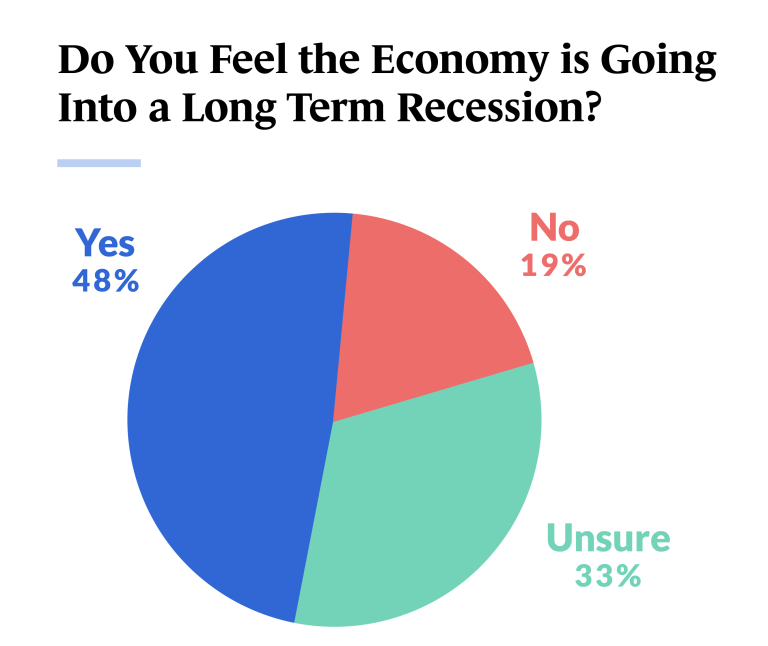
Only 19 percent of respondents believed that the US isn’t going into a long-term recession, while 33 percent remained unsure about the state of the economy.
Likewise, a majority of business owners of color doubt today’s changing economic climate. Nearly half of the respondents felt either “somewhat unconfident” (29%) or “very unconfident” (11%). Still, 38 percent of business owners are “somewhat confident” (30%) to “very confident” (8%). The remaining 22 percent felt neutral. Interestingly, our study also showed that small business owners of color were more confident about the economy than all other business owners surveyed this year, with a 16 percent higher confidence level.
While many are concerned about a long-term recession, a majority of business owners of color surveyed feel confident in staying afloat. Small business owners are no stranger to economic uncertainty — and the vast majority are confident in their ability to navigate today’s economic challenges.
Seventy-four percent of respondents expect to survive in today’s economy, while 22 percent remained unsure. Only four percent felt otherwise.
This data is a testament to the resilience, determination, and rising confidence among small business owners of color. Similarly, our main study found that over 76 percent of all business owners surveyed are optimistic about the future of their businesses — even in today’s changing economy.

Top Challenges
From economic uncertainty to political unrest, small business owners of color have faced a number of challenges this year. Recruitment and retention, inflation, and lack of capital were the three biggest challenges reported among small businesses of color this year.
Among the respondents surveyed, 24 percent identified recruitment and retention as a primary challenge. This trend continues from the previous year, though fewer reported difficulty this year.
The second most reported challenge was inflation and rising prices (21%) and the third was lack of capital (16%).
While these were also the top three challenges reported by all segments, it’s worth noting that business owners of color reported having difficulty with cash eight percent more than our average sample. This disparity is present in previous years’ data, reaching as much as 10%.
Profitability in the Face of Adversity
According to our study, a majority of small business owners of color are currently profitable. Fifty-four percent of businesses owned by people of color were profitable this year, while the remaining 46 percent of businesses were unprofitable.
This data is a reassuring sign, especially given the ongoing economic challenges and uncertainty small business owners face this year. It’s also worth noting that most surveyed respondents are new business owners. Small businesses, on average, take two to three years to reach profitability.
Despite being fledgling businesses, most small businesses of color were profitable this year — which is a testament to the hard work and resilience of their owners.
Prosperity Amidst Uncertainty
Small business owners of color have demonstrated remarkable tenacity in the face of economy uncertainty. While many are wary of the future, a majority are confident in their ability to survive — and even thrive — in today’s economy.
In fact, our study shows that small business owners of color are predominantly profitable, even with many being new businesses. Most respondents surveyed are also happy business owners, with more business owners of color reporting satisfaction compared to our overall study. Although many respondents feel optimistic and content, they have braved their fair share of challenges this year.
Recruitment and retention along with inflation and lack of capital were among the top challenges this year for business owners of color. Despite the persistent challenge of recruitment and retention, however, small business owners of color continue to make significant strides in recruiting — outpacing all other small businesses in the country.
This data underscores the resilience of small business owners of color, who continue to persevere and overcome challenges with unwavering determination.
Trending
Your new life is right around the corner.
Together, we can get your business off the ground — no matter where you are in the small business process.

